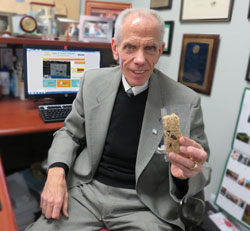Toms River school district passed a partnership with the University this January, that will allow education majors the opportunity to receive field experience working in the school district, Thomas Gialanella, Interim Superintendent of Toms River schools said. Students will be placed into the district as early as Sept. 2014.
Lynn Romeo, Dean of the School of Education, said that the University is currently partnered with 24 school districts, 18 of which are in Monmouth County to allow education majors the opportunity to learn outside of the classroom. According to Romeo, a partnership is explained as a collaborative relationship between the school of education and local districts, and is unique to each district’s needs.
Though the University is involved in previous partnerships, this is their first with Toms River. Gialanella said, “We’re exploring with Monmouth what staff development opportunities our staff would have with the faculty and the people at Monmouth.”
The partnership is expected to create developments such as a novice teacher induction program, staff development on teacher evaluation programs, as well as allowing students to become student-teachers at Toms River schools, Gialanella added.
Gialanella and the School of Education previously had a working relationship prior to the Toms River partnership, according to Romeo. In 2013, Gialanella was the superintendent of the Jackson school district, one of the first districts to partner with the University.
According to Gialanella, forming connections in Toms River schools can benefit education majors once they graduate. “If you’re doing your student teaching here it’s better than an interview. And if you’ve done a good job student teaching, that’s going to improve your chances,” he said. Although, Gialanella added that student teaching in the Toms River district does not guarantee education majors a career once they graduate.
Shannon Yingst, junior English education major, said that working with a local school can also increase job opportunities in other areas. “Having a school partnered with Monmouth exclusively will help education students fan out into more than just the surrounding districts,” said Yingst.
Yingst added that this partnership also has the ability to improve current field experience conditions. “Currently I have field placement hours for an ESL (meaning of ESL) class in a local school [along with] three other classmates with the same teacher,” said Yingst. “This limits the availability of the teacher and makes it harder to complete our hours.”
Gialanella said that working with the University will benefit the students at Toms River as well. “I think [the partnership is] going to help prepare our teachers and administrators for what’s coming in the future,” he said. “Monmouth does a great job of providing that development and knowing what is coming in the future, and sharing it with our staff can only benefit our students.”
Christine Bryk, a senior education major at Albright College is originally from Monmouth County and believes that partnering with local schools is very good for the University. “The more you expose yourself to different classes and styles of teaching, that is only going to help you build up how you will teach your [future] class,” Bryk said. “It is a nice safety blanket for the education department to also help with student teaching placements…”
Bryk added that she encourages education majors to find experience in more than one district to gain different perspectives on teaching.
Toms River and the University agreed that this will be a positive thing for both of their reputations. University students can spread their “good name in the classroom,” according to Yingst.
Gialanella added, “A relationship with a University like Monmouth can only help us, it can’t hurt us.”
The University has a list of schools and districts that they are currently partnered with on their website. Students may begin field experience after their acceptance into the education program in their sophomore year, according to the School of Education.


